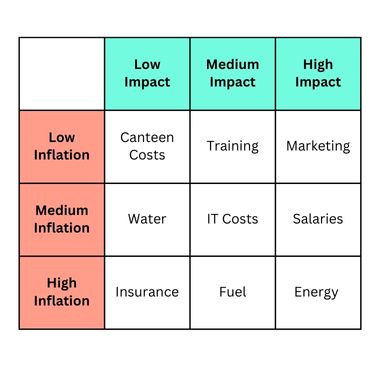How businesses can better cope with rising inflation
29 Nov 2022
Categories & Tags

How businesses can better cope with rising inflation
For the vast majority of business owners, the past few years have been like nothing else ever experienced. In February 2020, nobody could have predicted within their forecasts what was coming next. Rising inflation is of course more unwelcome news, but there are some things every business could be doing to try and control what’s coming next. The impact and severity of rising inflation will of course depend on the nature of the business; manufacturers will have significantly higher energy costs than a small workforce who have home-working flexibility. Here’s our tips for helping your business better cope with rising costs.
Understand your business costs better
This simple yet effective task could make a difference to how you run your business and the decisions you make. All you need to do is divide your costs into categories.
Step 1 - Designate every business cost as low, medium or high impact to the business, particularly if they change e.g. losing team members could have a high impact on productivity and output.
Step 2 – Designate the same costs as low, medium or high exposure to inflation.
This could be done in a matrix similar to this:

Once done, put all your energy and focus into those costs that fall within the High/High box, and then work through the next top boxes.
Let’s have a think about profit margins. A business with a 20% profit margin spends 80% of its revenue on costs. With inflation running at 10% per annum, this would add another 8% to costs, meaning costs will increase to 88%, with profits almost being halved. This type of review should help to sharpen the incentive to make changes in good time.
Fix it if you can
If your business has costs which are highly sensitive to inflation, either now or in the future, consider if there is an opportunity to fix costs now. The downside to this of course is having higher costs now, but in the short to medium-term it may well be better to fix it. We’ve already heard horror stories of businesses which rely heavily on energy costs and have seen a 350% increase in electricity bills. This is a harsh reality of the current business world.
Plan for tomorrow
There are many businesses that do not have a complete handle or visibility over current and future financial performance. If you fall into that category, there is no better time to start working on improving your visibility and sharing that information with those that need it (accountant, banks, suppliers, business decision makers). Once you have these insights, ask yourself questions like ‘what if?’ and ‘should I?’ Refer back to your costs matrix to really try and make a positive difference on your profits and cash flow.
The price is right
Or is it? You may not be able to directly control all your costs, but you can of course control your pricing. Increasing prices right now may feel like a difficult thing to do, given the complete awareness of the cost rises all businesses are making right now. But often in small businesses, pricing is under-optimised, meaning there should be room for review.
Your ability to increase prices will depend on many factors, but maintaining margins and financial health is key to success (and survival in some instances). Factors such as whether or not your goods or services are ‘must-haves’ or ‘nice-to haves’ will ultimately determine your pricing power.
Cash is king
Never has a truer word been said in business. It’s difficult right now for businesses to build and retain cash, meaning any unexpected forks in the road can be navigated. As a rule of thumb, as a minimum aim to have three-month’s worth of costs in cash. If you feel you need to increase your cash availability, consider the financing facilities that are available to you, and/or try to out more money into savings from your day-to-day operations.
Your team
Last but not least, your team will of course be at the forefront of your mind, as everyone is feeling the pinch of inflation personally. People are the backbone of any business, so plan ahead for any salary increases. Don’t forget, it’s not just the gross salary that will increase. Employers’ NI and Pension costs will also be directly affected. If salary increases are going to be difficult, review what other benefits you can offer, such as work from home allowances and salary sacrifice benefits. Also consider how you can improve productivity, with investments in technology, training and process improvements. Every little helps, and your team will appreciate what you do.
More than ever, having great visibility and being able to plan ahead with good decision making should be a top priority. The biggest killer of any business is indecision, so be decisive and navigate your business through these choppy waters to sail into future success.
News & Resources

Simplified expenses on motor vehicles

Check how to claim a tax refund

Seizure of property by HMRC or Border Force

Entertaining employees

Car and travel costs if self employed

MTD for Income Tax – check if and when you need to use it

Corporation Tax 19% or 25%?


